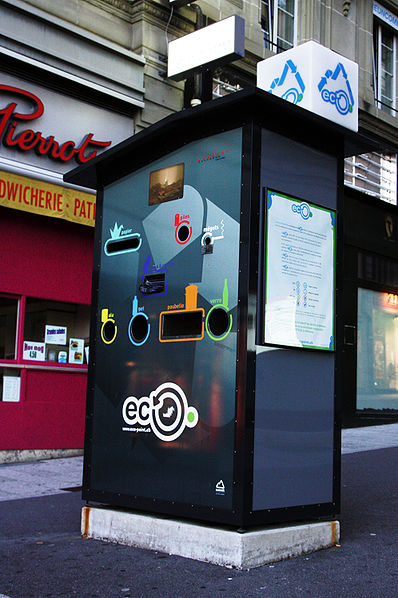The current list that depicts seven countries which have the highest recycling rates, is as follows (% represents the percentage of waste recycled):
- Switzerland – 52%
- Austria – 49.7%
- Germany – 48%
- Netherlands – 46%
- Norway – 40%
- Sweden – 34%
- United States – 31.5%
Switzerland also top the list of the world’s top ten paper recycling countries (measured against the production per 1,000 people, in tonnes):
- Switzerland – 167.36
- Sweden – 164.61
- Austria – 157.77
- Netherlands – 155.30
- USA – 144.14
- Germany – 140.55
- Finland – 134.80
- Japan – 116.55
- Norway – 98.26
- France – 93.62
Switzerland scores top marks in both lists, with the UK nowhere to be seen. So how can the UK catch up with Switzerland, and how are they getting their impressive results? More specifically for us, how can London learn from the Swiss and how can we improve our junk collection methods?
Recycling in Switzerland is categorised by different materials. They separate their recycling material into green waste, metal waste, waste glass, paper and paperboard, plastic waste, waste wood and waste oil and solvents. It is not uncommon to find at least 4 bins for separate materials in one household. You will find the common number of bins now, for a Londoner specifically, is three. One for recycling material, general waste and now small food waste bins.
Green waste is for material that can be composted or fermented. Metal waste includes any form of scrap steel, copper, iron and aluminium. A lot of bulk waste is recycled in Switzerland with complex objects such as vehicles, chemicals and electrical goods going through several treatment steps where they are cleared of hazardous substances and recovered. Once materials in a good and functioning condition are laid out, they are mostly separated and reused (sold as second hand products).

Picture taken by Rama, unedited, license here: http://creativecommons.org/licenses/by-sa/2.0/fr/deed.en
In certain countries you can be fined for not filtering your recycling correctly which puts pressure on you to make sure you filter your waste correctly. On the other hand you can also receive money for recycling. In countries such as Germany you pay a little extra when purchasing the bottles and cans you buy, containing things like water and beer. However, you are reimbursed for the extra money paid when you recycle your empty bottles and cans in isolated machines (you can find them in super markets) and you will receive your money back there and then. This is a great incentive to recycle as you are rewarded directly.
You will also find that in the counties that are topping these lists, it’s not only about the recycling efforts going on in private homes but also those encouraged in public. You will often see public buildings and places which offer the public several compartments within one bin. These bins usually offer a place for you to dispose of glass, paper and waste (also known as restmull). These bins are making more of an appearance in the UK. You can find some of these bins in places such as universities. If they work so well, then maybe it is time that we started to see more in the very public and tourist heavy areas of London; places like Trafalgar Square, the London Eye and Oxford Street. Some of the team have spotted a few similar things in Wandsworth, so it is certainly doable.
If the whole recycling process is a bit daunting to you then you can always use a rubbish removal service a few times and then ask for their advice about what you should do with it in the future. Rubbish collection in London can be difficult, so please give us a ring and we’ll help you out!






